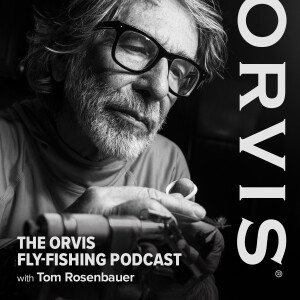
This week I interview the great George Daniel (interview starts at 48:40), who you will see soon in the new installments of the Orvis TV show. The show I did with him, on Euro Nymphing basics, should be premiered sometime in May. But until then, George discusses the pros and cons of using straight monofilament vs. and actual fly line for Euro Nymphing—both have their advantages and George gives us some good guidance on their use, as well as other tips on this deadly method of fly fishing borrowed from competition anglers. We also get sidetracked on the future of fly fishing and how both of us view the participation of younger anglers today.
In this Fly Box this week, we have some interesting questions:
I am taking a six-day backpacking trip into the Appalachians. How much water should I expect to cover in a day of fishing? How do I combat the “old boy” network in fly fishing? What strategies do you recommend for carp in a small lake? What does “web” refer to in fly tying, and what is schlappen? Do you think a Helios 905F will be good enough for fishing the Blackfoot, Rock Creek, Gallatin, and Yellowstone Rivers or will I need a 905D? How do you go about experimenting with new fly patterns you have tied? Can I catch carp on a fly during the winter? I have trouble with “trout setting” in salt water. Should I use a strip strike in all my trout fishing to get out of the habit? Why doesn’t Orvis offer water testing kits? I know trout do 90% of their feeding underwater, but I have recently discovered how effective a dry fly can be, even when no trout are rising. Why should tippet size matter when fish can always see the hook? Do you have a recommended leader for juvenile tarpon, and also for barracuda?More Episodes
 2024-03-25
2024-03-25
 2024-02-26
2024-02-26
Create your
podcast in
minutes
- Full-featured podcast site
- Unlimited storage and bandwidth
- Comprehensive podcast stats
- Distribute to Apple Podcasts, Spotify, and more
- Make money with your podcast
It is Free
- Privacy Policy
- Cookie Policy
- Terms of Use
- Consent Preferences
- Copyright © 2015-2024 Podbean.com




